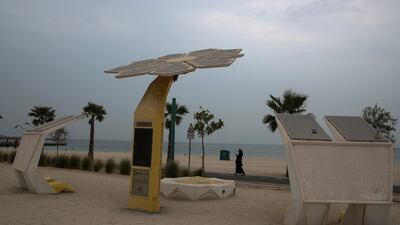Dubai will begin to execute plans aimed at boosting energy efficiency and reducing carbon emissions in the emirate, officials said.
Dubai’s Supreme Council of Energy held a meeting to review the emirate’s efforts to achieve net-zero carbon emissions by 2050, Dubai Media Office said on Sunday.
Sheikh Ahmed bin Saeed, chairman of the Dubai Supreme Council of Energy, emphasised the importance of co-operation among the related organisations in the UAE to achieve the objectives of the UAE Net Zero by 2050 strategic initiative, while chairing the council's 73rd meeting online.
“We discussed the national system for trading carbon credits in co-operation with the Ministry of Climate Change and the Environment,” said Ahmed Al Muhairbi, secretary general of the Dubai Supreme Council of Energy.
“We also discussed a classification programme for existing buildings to monitor the efficiency of water and electricity use as an optional initiative for residential and commercial buildings.”
Dubai's Enoc is in talks with suppliers about the possibility of using the Falcon pipeline to supply jet fuel to Al Maktoum International Airport to reduce land transport and carbon emissions, the media office said.
Passenger traffic at Dubai’s second aviation hub has surged in recent weeks due to Fifa World Cup flights.
“At the Dubai Supreme Council of Energy, we are working to implement the road map and plans that include national initiatives and strategies to reach net-zero carbon emissions by 2050 and consolidate the foundations for a low-carbon economy,” Saeed Al Tayer, vice chairman of the Dubai Supreme Council of Energy, said.
The UAE, Opec’s third-largest oil producer, is pursuing goals to reduce its carbon footprint and became the first country in the Middle East to set a net-zero target last year.
The Emirates plans to invest $160 billion in clean and renewable energy sources over the next three decades.
It is building the Mohammed bin Rashid Solar Park in Dubai with a five-gigawatt capacity, one of Dubai Electricity and Water Authority’s mega infrastructure projects.
Abu Dhabi, which is developing a two-gigawatt solar plant in Al Dhafra region, has set a target of 5.6 gigawatts of solar PV capacity by 2026.
In 2017, the UAE launched its energy policy to boost clean energy and cut dependence on natural gas to generate power.
The UAE Energy Plan 2050 aims to cut carbon dioxide emissions by 70 per cent, increase clean energy use by 50 per cent and improve energy efficiency by 40 per cent by the middle of the century, resulting in savings worth Dh700 billion ($190.6 billion).
The policy’s targets for the source of energy for local consumption by 2050 have been set at 44 per cent from renewables, 38 per cent from gas, 12 per cent from clean fossil and 6 per cent from nuclear.

